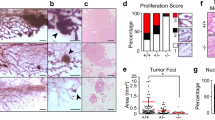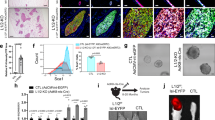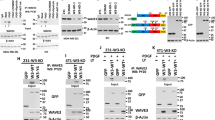Abstract
There is increasing evidence for the role of wild-type p53 induced phosphatase 1 (Wip1) phosphatase in the regulation of tumorigenesis. To evaluate Wip1 as a breast cancer oncogene, we generated a mouse strain with targeted expression of Wip1 to the breast epithelium. We found that these mice are prone to cancer when intercrossed with transgenics expressing the ErbB2 oncogene but not conditional knockouts for Brca2. This tumor-prone phenotype of Wip1 is fully eliminated through attenuation of proliferation by activating the MKK6/p38 mitogen-activated protein kinases (MAPK) cascade in mice bearing a constitutively active form of MKK6. We propose that Wip1 phosphatase operates within the MKK6/p38 MAPK signaling pathway to promote ErbB2-driven mammary gland tumorigenesis.
This is a preview of subscription content, access via your institution
Access options
Subscribe to this journal
Receive 50 print issues and online access
$259.00 per year
only $5.18 per issue
Buy this article
- Purchase on Springer Link
- Instant access to full article PDF
Prices may be subject to local taxes which are calculated during checkout



Similar content being viewed by others
References
Belova GI, Demidov ON, Fornace AJ, Bulavin DV . (2005). Chemical inhibition of Wip1 phosphatase contributes to suppression of tumorigenesis. Cancer Biol Ther 4: 1154–1158.
Brancho D, Tanaka N, Jaeschke A, Ventura JJ, Kelkar N, Tanaka Y et al. (2003). Mechanism of p38 MAP kinase activation in vivo. Genes Dev 17: 1969–7198.
Bulavin DV, Demidov ON, Saito S, Kauraniemi P, Phillips C, Amundson SA et al. (2002). Amplification of PPM1D in human tumors abrogates p53 tumor-suppressor activity. Nat Genet 31: 210–215.
Bulavin DV, Phillips C, Nannenga B, Timofeev O, Donehower LA, Anderson CW et al. (2004). Inactivation of the Wip1 phosphatase inhibits mammary tumorigenesis through p38 MAPK-mediated activation of the p16(Ink4a)-p19(Arf) pathway. Nat Genet 36: 343–350.
Fiscella M, Zhang H, Fan S, Sakaguchi K, Shen S, Mercer WE et al. (1997). Wip1, a novel human protein phosphatase that is induced in response to ionizing radiation in a p53-dependent manner. Proc Natl Acad Sci USA 94: 6048–6053.
Fujimoto H, Onishi N, Kato N, Takekawa M, Xu XZ, Kosugi A et al. (2006). Regulation of the antioncogenic Chk2 kinase by the oncogenic Wip1 phosphatase. Cell Death Differ 13: 1170–1180.
Hirasawa A, Saito-Ohara F, Inoue J, Aoki D, Susumu N, Yokoyama T et al. (2003). Association of 17q21-q24 gain in ovarian clear cell adenocarcinomas with poor prognosis and identification of PPM1D and APPBP2 as likely amplification targets. Clin Cancer Res 9: 1995–2004.
Jonkers J, Meuwissen R, van der Gulden H, Peterse H, van der Valk M, Berns A . (2001). Synergistic tumor suppressor activity of BRCA2 and p53 in a conditional mouse model for breast cancer. Nat Genet 29: 418–425.
Kallioniemi A, Kallioniemi OP, Piper J, Tanner M, Stokke T, Chen L et al. (1994). Detection and mapping of amplified DNA sequences in breast cancer by comparative genomic hybridization. Proc Natl Acad Sci USA 91: 2156–2160.
Li J, Yang Y, Peng Y, Austin RJ, van Eyndhoven WG, Nguyen KCQ et al. (2002). Oncogenic properties of PPM1D located within a breast cancer amplification epicenter at 17q23. Nat Genet 31: 133–134.
Lu X, Nannenga B, Donehower LA . (2005). PPM1D dephosphorylates Chk1 and p53 and abrogates cell cycle checkpoints. Genes Dev 19: 1162–1174.
Raingeaud J, Whitmarsh AJ, Barrett T, Dérijard B, Davis RJ . (1996). MKK3- and MKK6-regulated gene expression is mediated by the p38 mitogen-activated protein kinase signal transduction pathway. Mol Cell Biol 16: 1247–1255.
Rauta J, Alarmo EL, Kauraniemi P, Karhu R, Kuukasjarvi T, Kallioniemi A . (2006). The serine-threonine protein phosphatase PPM1D is frequently activated through amplification in aggressive primary breast tumours. Breast Cancer Res Treat 95: 257–263.
Saito-Ohara F, Imoto I, Inoue J, Hosoi H, Nakagawara A, Sugimoto T et al. (2003). PPM1D is a potential target for 17q gain in neuroblastoma. Cancer Res 63: 1876–1883.
Shreeram S, Demidov ON, Hee WK, Yamaguchi H, Onishi N, Kek C et al. (2006). Wip1 phosphatase modulates ATM-dependent signaling pathways. Mol Cell 23: 757–764.
Sinclair CS, Rowley M, Naderi A, Couch FJ . (2003). The 17q23 amplicon and breast cancer. Breast Cancer Res Treat 78: 313–322.
Takekawa M, Adachi M, Nakahata A, Nakayama I, Itoh F, Tsukuda H et al. (2000). p53-inducible Wip1 phosphatase mediates a negative feedback regulation of p38 MAPK-p53 signaling in response to UV radiation. EMBO J 19: 6517–6526.
Timofeev O, Lee TY, Bulavin DV . (2005). A subtle change in p38 MAPK activity is sufficient to suppress in vivo tumorigenesis. Cell Cycle 30: 118–120.
Trost TM, Lausch EU, Fees SA, Schmitt S, Enklaar T, Reutzel D et al. (2005). Premature senescence is a primary fail-safe mechanism of ERBB2-driven tumorigenesis in breast carcinoma cells. Cancer Res 65: 840–849.
Yamaguchi H, Minopoli G, Demidov ON, Chatterjee DK, Anderson C W, Durell SR et al. (2005). Substrate specificity of the human protein phosphatase 2Cδ, Wip1. Biochemistry 44: 5285–5294.
Author information
Authors and Affiliations
Corresponding author
Rights and permissions
About this article
Cite this article
Demidov, O., Kek, C., Shreeram, S. et al. The role of the MKK6/p38 MAPK pathway in Wip1-dependent regulation of ErbB2-driven mammary gland tumorigenesis. Oncogene 26, 2502–2506 (2007). https://doi.org/10.1038/sj.onc.1210032
Received:
Revised:
Accepted:
Published:
Issue Date:
DOI: https://doi.org/10.1038/sj.onc.1210032
Keywords
This article is cited by
-
Clonal haematopoiesis - a novel entity that modifies pathological processes in elderly
Cell Death Discovery (2023)
-
Ppm1d truncating mutations promote the development of genotoxic stress-induced AML
Leukemia (2023)
-
Inhibition of the DNA damage response phosphatase PPM1D reprograms neutrophils to enhance anti-tumor immune responses
Nature Communications (2021)
-
Wip1 controls the translocation of the chromosomal passenger complex to the central spindle for faithful mitotic exit
Cellular and Molecular Life Sciences (2021)
-
Her2 promotes early dissemination of breast cancer by suppressing the p38-MK2-Hsp27 pathway that is targetable by Wip1 inhibition
Oncogene (2020)



